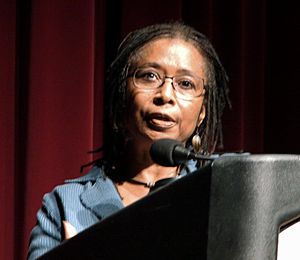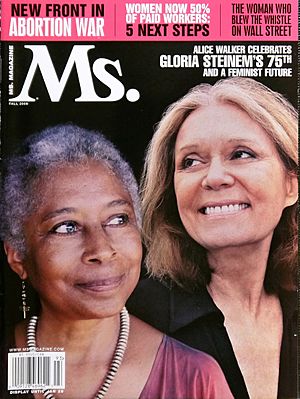Alice Walker facts for kids
Quick facts for kids
Alice Walker
|
|
|---|---|

Walker in 2007
|
|
| Born | Alice Malsenior Walker February 9, 1944 Eatonton, Georgia, U.S. |
| Occupation |
|
| Education | Spelman College Sarah Lawrence College (BA) |
| Period | 1968–present |
| Genre | African-American literature |
| Notable works | The Color Purple |
| Notable awards | Pulitzer Prize for Fiction (1983) National Book Award (1983) |
| Spouse | |
| Partner | Robert L. Allen Tracy Chapman |
| Children | Rebecca Walker |
Alice Malsenior Tallulah-Kate Walker, born on February 9, 1944, is a famous American writer and activist. She writes novels, short stories, and poems. In 1982, she made history as the first African-American woman to win the Pulitzer Prize for Fiction. She received this important award for her well-known novel, The Color Purple.
Throughout her career, Alice Walker has written many books. These include seventeen novels and short story collections, twelve non-fiction books, and several collections of essays and poetry. She grew up in rural Georgia and faced challenges like a childhood injury and segregation. Despite this, she became the top student in her high school class. She later graduated from Sarah Lawrence College.
Alice Walker started her writing journey with her first book of poems, Once. She then wrote many novels, with The Color Purple being her most famous. She is also a dedicated activist. She took part in the Civil Rights Movement. She also championed the rights of women of color, using the term "womanism" to describe her work. She cares deeply about animals and works for peace.
Contents
Who is Alice Walker?
Her Early Life and School Days
Alice Malsenior Walker was born in Eatonton, Georgia, a small farming town. Her parents, Willie Lee Walker and Minnie Tallulah Grant, were farmers who shared their crops. Her mother also worked as a seamstress to earn extra money for their family. Alice was the youngest of eight children. She started school at East Putnam Consolidated when she was just four years old.
When Alice was eight, she had an accident with a BB gun that injured her right eye. Because her family didn't have a car, she couldn't get medical help right away. This caused her to lose sight in that eye. After this injury, Alice found comfort and a new passion in reading and writing. When she was 14, doctors removed the scar tissue, but a small mark stayed. She wrote about this experience in her essay, "Beauty: When the Other Dancer is the Self."
Schools in Eatonton were segregated at the time. This meant Black students attended separate schools. Alice went to Butler Baker High School, the only one available for Black students. She excelled there and became the top student in her class. In 1961, she received a full scholarship from Georgia to attend Spelman College.
At Spelman, professors Howard Zinn and Staughton Lynd were important mentors to her. Later, she received another scholarship to Sarah Lawrence College in Yonkers, New York. She accepted this offer and graduated in 1965.
Her Journey as a Writer

Alice Walker wrote the poems for her first book, Once, while studying in East Africa and during her last year at Sarah Lawrence College. She would leave her poems for her professor, Muriel Rukeyser, who then shared them with her literary agent. Once was published four years later.
After college, Walker worked briefly for the New York City Department of Welfare. She then moved back to the South. She worked for the Legal Defense Fund of the National Association for the Advancement of Colored People in Jackson, Mississippi. She also helped the Friends of the Children of Mississippi Head Start program with Black history.
Later, she became a writer-in-residence at Jackson State University (1968–69) and Tougaloo College (1970–71). In 1970, she published her first novel, The Third Life of Grange Copeland. This book tells the story of Grange Copeland, a farmer who shared his crops.
During this time, Walker also published her writings in small magazines that supported women's voices. These magazines were part of a movement by women to create their own ways of sharing ideas. In 1995, she signed a pledge to support these important women's publications.
In 1973, Alice Walker and scholar Charlotte D. Hunt found what they believed was the unmarked grave of writer Zora Neale Hurston. Walker arranged for a marker to be placed there. This helped bring new attention to Hurston's work. Walker's 1975 article, "In Search of Zora Neale Hurston," further helped people rediscover this important writer.
Famous Books and Stories
In 1976, Walker's second novel, Meridian, was published. This novel is about activists in the South during the civil rights movement. It includes events similar to some of Walker's own experiences.
In 1982, she published her most famous book, The Color Purple. This novel tells the story of a young Black woman facing challenges in a society with racism and unequal power. The book became a bestseller. It was later made into a popular movie in 1985, directed by Steven Spielberg. It starred Oprah Winfrey and Whoopi Goldberg. It also became a Broadway musical in 2005.
Walker has written other novels, including The Temple of My Familiar (1989) and Possessing the Secret of Joy (1992). She has also published many collections of short stories, poems, and other writings. Her work often focuses on the experiences of Black people, especially women, and their lives in a world that can be unfair.
In 2000, Walker released a collection of short stories called The Way Forward Is With a Broken Heart. These stories were inspired by her own life and explored themes of love and relationships between different races.
In 2007, Alice Walker gave her papers, including manuscripts and letters, to Emory University. This collection includes drafts of The Color Purple, unpublished poems, and letters with family and friends. It also has a scrapbook of poems she made when she was 15.
In 2013, Alice Walker published two new books. One was The Cushion in the Road: Meditation and Wandering as the Whole World Awakens to Being in Harm's Way. The other was a book of poems called The World Will Follow Joy: Turning Madness into Flowers (New Poems).
Standing Up for What's Right: Her Activism
Fighting for Civil Rights
Alice Walker met Martin Luther King Jr. when she was a student at Spelman College in the early 1960s. She says King inspired her to return to the American South and become an activist in the Civil Rights Movement. She participated in the 1963 March on Washington with many other people. Later, she volunteered to help Black citizens register to vote in Georgia and Mississippi.
On March 8, 2003, International Women's Day, Alice Walker was arrested with 26 other people. This happened during an anti-war protest outside the White House. She wrote about this experience in her essay "We Are the Ones We Have Been Waiting For."
Supporting Women of Color (Womanism)
Alice Walker's unique approach to supporting women included advocating for women of color. In 1983, she created the term womanist in her book In Search of Our Mothers' Gardens. She defined it as "a Black feminist or feminist of color." This term aimed to bring together women of color and the feminist movement. It focused on how race, social class, and gender can create challenges. Walker explained that "'Womanism' gives us a word of our own."
Caring for Animals
Alice Walker has often said that caring for animals is very important to her. Her stories increasingly include animals as active characters. They also serve as symbols for what she calls "consciousness." She encourages people to love nature, respect other humans and animals, and appreciate our Earth. She believes this is a key part of her work.
Promoting Peace
Alice Walker has been a long-time supporter of the Women's International League for Peace and Freedom. She believes that movements for peace and justice help us find inner strength. This strength allows us to bring a more caring vision into the world. She has written several books that share her peaceful views, including The Same River Twice and We are the Ones We have been Waiting for: Inner Light in a Time of Darkness. In these works, she discusses the importance of creating a fair and peaceful society.
Her Personal Life
In 1965, Alice Walker met Melvyn R. Leventhal, a Jewish civil rights lawyer. They married on March 17, 1967, in New York City. Later that year, they moved to Jackson, Mississippi. They were the first legally married interracial couple in Mississippi since laws against such marriages were introduced. Their daughter, Rebecca Walker, was born in 1969. Alice and Melvyn divorced in 1976.
In the late 1970s, Walker moved to northern California. In 1984, she and fellow writer Robert L. Allen started Wild Tree Press, a publishing company that focused on women's voices. In 1994, Walker legally added "Tallulah Kate" to her name. This was to honor her mother, Minnie Tallulah Grant, and her paternal grandmother, Tallulah, who was Cherokee.
Alice Walker has shared that her spirituality has influenced her novels, including The Color Purple. She has also shown interest in Transcendental Meditation. Her writing often explores religion, following a tradition of writers like Zora Neale Hurston. Walker has mentioned that her stories sometimes include parts of her own life.
Teaching and Sharing Ideas
Beyond her civil rights work, Alice Walker also taught others about the Black feminist movement. She taught courses at several universities. In 1972, she taught about Black Women's Writers at the University of Massachusetts Boston. She also taught at Wellesley College and Brandeis University in 1973. That same year, she published her collection of short stories, In Love and Trouble: Stories of Black Women, and a poetry book, Revolutionary Petunias and Other Poems. She also gave lectures on African-American Women Studies at Yale University and University of California, Berkeley. Through her teaching, Walker helped spread important ideas about the Black feminist movement across America.
Alice Walker in Movies and Art
Beauty in Truth (2013) is a documentary film about Alice Walker. It was directed by Pratibha Parmar. There is also a photograph of her called Phalia (Portrait of Alice Walker) (1989). This photo was taken by Maud Sulter as part of her Zabat series.
Awards and Recognitions
Alice Walker has received many awards and honors for her writing and activism:
- MacDowell Colony Fellowships (1967 and 1974)
- Ingram Merrill Foundation Fellowship (1967)
- Candace Award, Arts and Letters, National Coalition of 100 Black Women (1982)
- Pulitzer Prize for Fiction (1983) for The Color Purple
- National Book Award for Fiction (1983) for The Color Purple
- O. Henry Award for "Kindred Spirits" (1985)
- Langston Hughes Medal, (1988), City College of New York
- Honorary degree from the California Institute of the Arts (1995)
- American Humanist Association named her as "Humanist of the Year" (1997)
- Lillian Smith Award from the National Endowment for the Arts
- Rosenthal Award from the National Institute of Arts & Letters
- Radcliffe Institute Fellowship, the Merrill Fellowship, and a Guggenheim Fellowship
- Front Page Award for Best Magazine Criticism from the Newswoman's Club of New York
- Induction into the Georgia Writers Hall of Fame (2001)
- Induction into the California Hall of Fame in The California Museum for History, Women, and the Arts (2006)
- Domestic Human Rights Award from Global Exchange (2007)
- The LennonOno Grant for Peace (2010)
- The Haydée Santamaría medal (2024)
Her Works
Novels and Short Stories
Poetry Collections
Non-Fiction Books
Essays
|
See also
 In Spanish: Alice Walker para niños
In Spanish: Alice Walker para niños
- List of animal rights advocates
 | Laphonza Butler |
 | Daisy Bates |
 | Elizabeth Piper Ensley |


